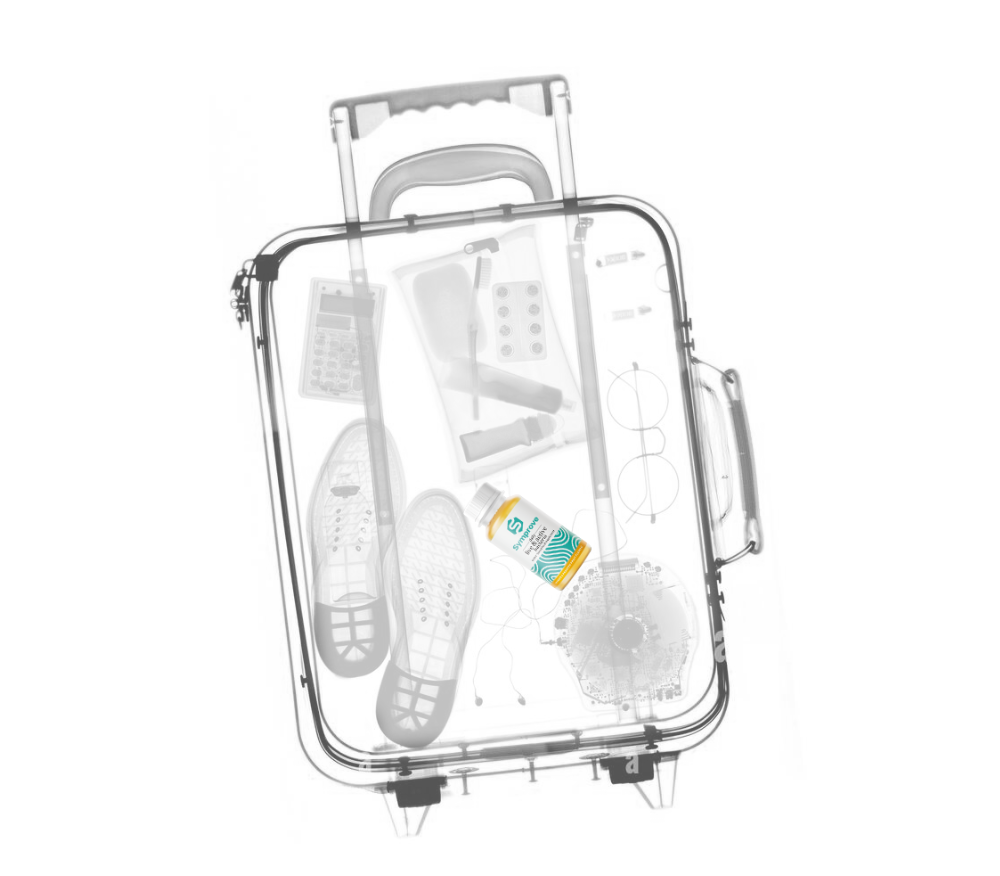If you’re anything like me, getting ready for a holiday is a whole ordeal that takes weeks. I’ll prep a meticulous packing list, outlining all the stretchy clothes I need to pack. I’ll have learnt the phrase “where is the toilet” in the language of the country I’m travelling to, just in case. And there will likely be a small bubble of anxiety building in the pit of my stomach around how the change in climate, flight, and routine will impact my gut. Because we all know about traveller’s diarrhoea, right?
Anyone relate? I’m here armed with expert tips from Dietitian Laura Tilt to help you travel with confidence. Think of me as your travel bestie. I’ve got you, because I’ve been there.
What happens to your gut when you travel?
Turns out your gut microbes are big fans of routine. When that’s disrupted, be it through a change in time zone, less sleep or a change in eating patterns, it can unsettle the circadian rhythm and your gut bacteria.
So, what can we do about it?
Let’s talk packing essentials
Dietitian Laura Tilt recommends checking if you’re travelling to a low or high-risk area for traveller’s diarrhoea and familiarising yourself with recommendations on food and water safety. “If you do get hit by tummy troubles, having something on hand to help manage symptoms means you won’t be stuck trying to find an out of hours pharmacy.”
And then there’s the idea of packing a gut health travel kit. “As well as regular meds, include a hand sanitiser and medications for common gut complaints like diarrhoea and constipation. Include some oral rehydration sachets for upset tummies, as dehydration is the most common complication of traveller’s diarrhoea. If you’re following a low FODMAP diet, consider packing some FODZYME sachets to make eating out easier.” Shares Tilt.
Let’s talk about prepping the high-fibre snacks. “Constipation is common when travelling, often due to a change in routine and diet. Packing some non-perishable high fibre foods you can add to meals or use as snacks can help avoid digestive slow down when there’s limited high fibre foods on the menu. My favourites are oatcakes, roasted nuts, a DIY trail mix with raisins, pistachios, walnuts and granola, a jar of peanut butter, dried apricots and prunes.”
You’ll also always find a handful of peppermint tea bags, floaty dresses which won’t restrict my tum, more pants than I’ll ever need (staying on the safe side) and my trusty bottles of Symprove On The Go in my suitcase.
Preparing your gut for takeoff
Right, we’ve packed our suitcase and are heading off to the departures lounge, but can you prepare your gut for takeoff?
“Bloating is a common side effect of air travel because as cabin pressure drops, the gas in your gut expands.” Tilt explains. Here are 6 things you can do to help limit the impact:
- “Wear loose, comfortable clothing—no tight waistbands!
- Avoid carbonated drinks and chewing gum.
- Stay hydrated with plenty of water but skip the alcohol.
- Stick with a lighter meal before you fly.
- When it’s safe to do so, take a walk and have a stretch. This supports circulation but it can also help gas move through the gut too.
- If you have a sensitive tummy, limit naturally gassy foods 24 hours before flying - common culprits include onion, garlic, broccoli, cabbage, beans and chickpeas.”
Noted. And I need no excuse to live in an elasticated waist.
Have you heard of the term gut lag?
If you cross two or more time zones, expect to feel gut lag as well as jet lag! A sudden shift in your sleep wake cycle can leave your gut out of sync because it also works on a 24-hour rhythm. Luckily, Tilt is on hand to help.
7 ways to adjust when you land from Laura Tilt
1. Embrace the change
Set your watch to local time when you board the plane and aim to sleep and eat at your new time zone if possible. Upon arrival, aim to stay awake until nighttime, even if that means a very early bedtime! If you nap, keep it short and sweet (we’re talking 15-20 minutes).
2. Morning sun
The day after you arrive, get outside into daylight as soon as you can after waking up, as this is one of the best ways to reset your body clock. A morning coffee in the sun? Yes please!
3. Include some daily movement
Exercise can help to keep your gut moving, so aim to include some daily movement. It doesn’t need to be high impact; a gentle walk, cycle or swim is ideal. If it’s hot, avoid exercising between 11 and 3 and drink plenty of fluids.
4. Time to decompress
Many of us go on holiday hoping for rest and rejuvenation away from the demands of daily life, but the mental gymnastics of getting to your destination, managing to pack everything you need, and the last-minute rush to finish work can leave you feeling frazzled. When you’re stressed, your gut feels it too and this can be a trigger for symptoms like diarrhoea, constipation and bloating.
Once you arrive, give yourself a day or two to unwind before diving into activities, and plan in some downtime each day and give yourself permission to rest.
5. Switch off
Taking a break from technology and social media can help you rest more fully and give your brain a proper break. I always think more clearly and feel more creative after time away from my phone too.
6. Immerse yourself in nature
Studies show that being near water or in a green space like a park or forest has a calming effect on the mind. If weather allows it, make the most of the outdoors - enjoy your morning coffee overlooking the water, read in a hammock, have dinner alfresco, plan to watch the sunset.
7. Take your time over meals
Mealtimes at home can be rushed or disjointed and we don’t often get to eat together. Embrace the chance to slow down, explore all the amazing local food and enjoy a long lunch or unhurried breakfast together. I love cooking but I’ll also enjoy taking a break - a bowl of olives, some local cheese, a crusty baguette, and a simple tomato salad can be perfect.
Now all that’s left to do is to take a deep breath and relax into your holiday. I’ll see you on the other side.
More from our holiday hub
How to Prep Your Gut for Summer
Prepping your gut for a holiday isn’t as obvious as packing sunscreen and a good book, but trust me, your stomach will thank you!
Dietitian Imogen Wolsey shares some tips and tricks to help you feel your best and keep things moving as they should be while on holiday.
How to Navigate the Holiday Buffet with a Sensitive Gut
If the holiday buffet leaves you feeling more anxious than excited, read on for Gastroenterology Dietitian Dr Sammie Gill's top tips.






